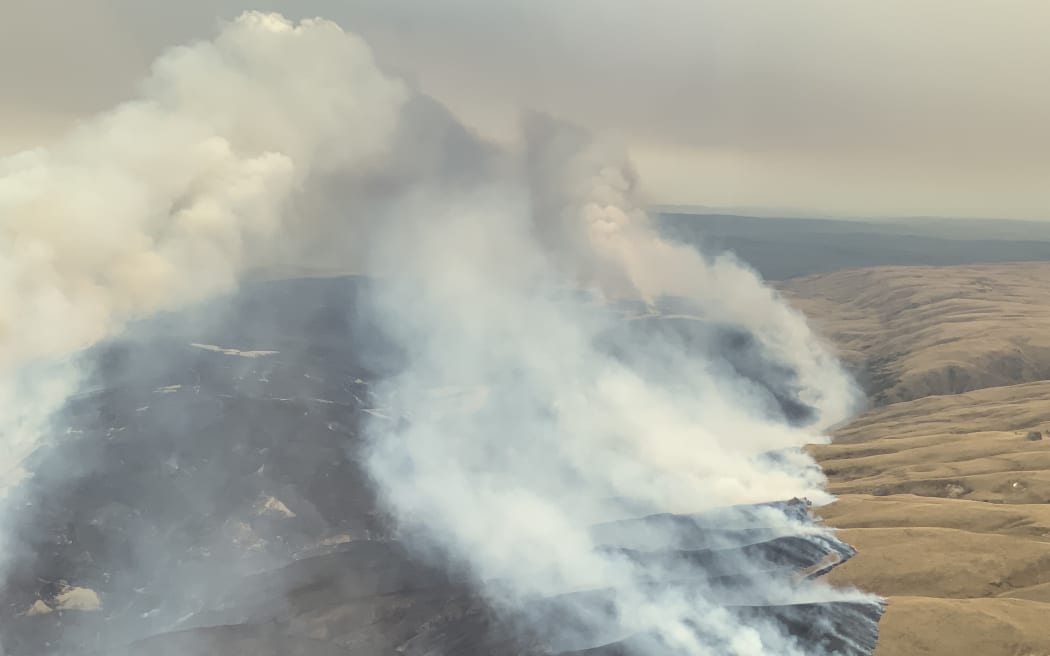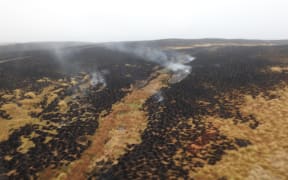Dunedin will not run out of water after a massive fire damaged the city's water supply, but it will come at a cost.

Photo: Supplied / Fire and Emergency NZ
The fire took hold near Middlemarch on Saturday, spreading across about 5000 hectares of grassland and into one of the city's main catchment areas.
While the fire has been contained, Dunedin now faces a summer without its largest water supply which has been contaminated.
For residents on the hills of Dunedin, the Deep Stream and Deep Creek catchments are their water lifelines.
They're the only two that are able to gravity feed the higher elevations - and have enough water to service the city's daily average demand of 44,000 cubic metres.
But Deep Stream - which usually supplies about 80 percent of the city's water needs - could be out of action for up to a year after becoming contaminated with firefighting chemicals and ash.
Dunedin City Council 3 Waters group manager Tom Dyer said the fire caused far more damage than the council had initially forecast.
"When we were contingency planning for this type of risk in the past, we were thinking if the catchment were to ignite, we might be looking at say 10 percent of it burning, which would be a much different picture in terms of water quality ... and our ability to treat it," Mr Dyer said.
"However, in this case we've had roughly between 50 and 75 percent of the catchment burn."
The demand on water is nearly split in half between the hilly and low lying suburbs.
The city does still have two other catchments as well as Deep Creek, but Tom Dyer said they required additional work to supply water to the Mount Grand Reservoir which supplies Dunedin's hills.
"We do have a back up pump so we can transfer water from the low levels to the high levels at a rate of about 14,000 cubic metres a day and when you add 7000 cubic metres a day from Deep Creek that makes up that roughly 20,000 figure. But there's not much room for error," he said.
It won't be cheap, costing $3000 each day to run the pump until the Deep Stream catchment was back online, Mr Dyer said.
The city has enough water to cater for its citizens, but he said residents would need to conserve water to make sure restrictions weren't needed this summer.
Dunedin Mayor Aaron Hawkins said work was underway to find out how bad the contamination is.
"Samples have been taken from Deep Stream and sent away for testing. At which point, we'll know the extent of the damage and be able to work out options for remediating that as quickly as we can to bring that supply back onboard," Mr Hawkins said.
Water NZ principal data scientist Lesley Smith said the government's plans for a water regulator could help in future events like the fire.
"One of their key functions will be to respond to incidents such as this and it's really important that we're able to pool on the technical expertise from around New Zealand at the push of a button to make sure our communities are prepared and able to have supplies when the worst strikes," Ms Smith said.
NIWA hydrologist and climate change scientist Dr Daniel Collins said fires could have a longer term impact than putting a catchment temporarily out of action.
"Fires can affect the availability of water supplies through ash or firefighting chemicals, but also in the longer term by changing the vegetation across the landscape and how much water can be yielded from a water supply catchment," Dr Collins said.
The council has plans to build a pipeline and pump station from its new Ross Creek Reservoir in the coming years, adding 8000 cumecs to the Mount Grand Reservoir.
Tom Dyer said the council wanted to ensure water security for the city's future.
"Having a resilient water supply can largely be about having your eggs placed in strategic baskets rather than all in one. We're looking to make sure that our network has flexibility to be able to deal with most risks," he said.
The contamination results of the Deep Stream catchment should be revealed later this week.
Dr Daniel Collins said much of Dunedin's water supply were from inland sources near Middlemarch.
"In a warmer world, according to NIWA studies, this area is projected to experience decline in rainfall and river flows during summer and greater increase during winter.
"Now Deep Stream and Deep Creek are essentially run a river supplies, they don't have reservoirs to store water from one season to another and so municipal water supplies from these catchments during summer would more on less decline in the future due to climate change."



